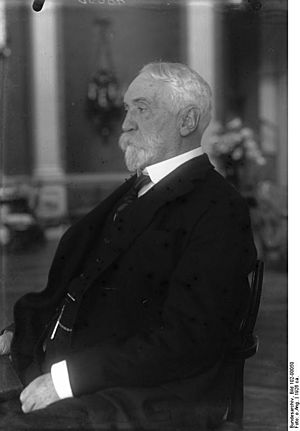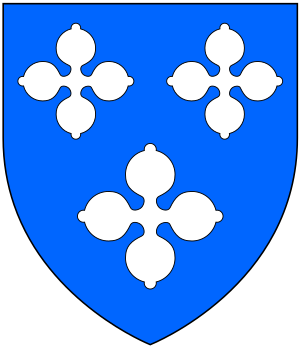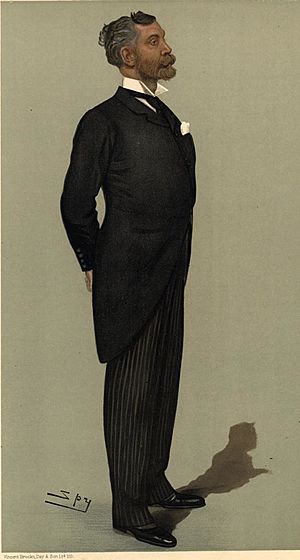Edgar Vincent, 1st Viscount D'Abernon facts for kids
Quick facts for kids
The Viscount D'Abernon
|
|
|---|---|

Lord D'Abernon in 1926
|
|
| British Ambassador to Berlin | |
| In office 1920–1925 |
|
| Preceded by | Victor Hay |
| Succeeded by | Sir Ronald Lindsay |
| Member of Parliament for Exeter | |
| In office 1899–1906 |
|
| Preceded by | Henry Northcote |
| Succeeded by | Sir George Kekewich |
| Personal details | |
| Born |
Edgar Vincent
19 August 1857 Slinfold, West Sussex, England |
| Died | 1 November 1941 (aged 84) Hove, England |
| Political party | Conservative |
| Spouses |
Helen Venetia Duncombe
(after 1890) |
| Parents | Sir Frederick Vincent, 11th Baronet Maria Copley |
| Education | Eton College |
Edgar Vincent, 1st Viscount D'Abernon (born August 19, 1857 – died November 1, 1941) was an important British figure. He was a politician, a diplomat who worked with other countries, an art collector, and an author. He held several high honors during his life.
Contents
Early Life and Education
Edgar Vincent was born in Slinfold, West Sussex, England. He was the youngest son of Sir Frederick Vincent and Maria Copley. He had older brothers, including Sir William Vincent and Sir Frederick d'Abernon Vincent.
He went to Eton College, a famous school, to prepare for a career in diplomacy. However, he first spent five years as a soldier in the Coldstream Guards. After that, he became a secretary to Lord Edmond Fitzmaurice.
A Look at His Career
Vincent began his career by helping with important international matters. He was appointed Commissioner for the Evacuation of Thessaly. This area was given to Greece by Turkey. He also advised the Egyptian government on money matters from 1883 to 1889.
In 1889, he became the governor of the Imperial Ottoman Bank. This bank was involved in many financial activities. In 1896, a group of armed Armenians took over the banking office in Constantinople. Vincent managed to escape and quickly informed the Turkish authorities. He also helped arrange for a negotiator from the Russian Embassy. The attackers agreed to leave peacefully in exchange for safe travel to France. Vincent even used his own private ship to help them.
Becoming a Member of Parliament
In 1899, Edgar Vincent was elected as a Conservative MP for Exeter. An MP is a person elected to represent their area in the country's parliament. He was a strong supporter of the Conservative leader, A. J. Balfour.
He held this position until 1906, when he lost the election to a Liberal candidate. He later joined the Liberal Party and tried to win a seat in Colchester in 1910, but was not successful. In 1914, he was given the title of Baron D'Abernon.
Helping Poland
In July 1920, D'Abernon was part of an important group called the Interallied Mission to Poland. This happened during the Polish-Soviet War. His experiences there later inspired him to write a book. The book was titled The Eighteenth Decisive Battle of the World: Warsaw, 1920.
British Ambassador to Germany
From 1920 to 1925, D'Abernon served as the British Ambassador to Berlin. An ambassador is a country's highest-ranking diplomat in another country. He played a key role in relations between Britain and Germany.
In 1921, he wrote that Germany would not be a military threat for many years. He believed it would be impossible for them to secretly build heavy weapons. In 1922, he shared his thoughts on a military alliance between Britain and France. He felt that Britain would take on too many responsibilities for a danger he thought was "imaginary." He believed that a German attack on France or England was unlikely for a long time.
In 1925, D'Abernon stated that it was important to trust Germans in their agreements. He believed they were more reliable than some other nations. Some historians later called his approach "appeasement." This term refers to a policy of giving in to demands to avoid conflict.
Later Life and Contributions
After retiring from his work as a diplomat, D'Abernon focused on many different organizations. He was involved with the Lawn Tennis Association and the Race Course Betting Control Board. He also worked with the Medical Research Council.
He was a trustee for the National and Tate Galleries, which are famous art museums. From 1926 to 1928, he was the President of the Royal Statistical Society. He also served on the Royal Mint advisory committee.
Personal Life and Art Collection
In 1890, D'Abernon married Helen Venetia Duncombe. She was known for her beauty. They both loved social events and fine arts, especially English paintings. Famous artist John Singer Sargent painted portraits of both of them. Helen's portrait was painted in 1904 at their home in Venice, Italy.
Vincent was the Chairman of a special commission on National Museums and Galleries. This group published a report in 1928. The couple had a large art collection. Most of it was sold in 1929. Some of their former artworks are now in famous museums. These include the National Gallery in London and the National Gallery of Art in Washington. Their collection also featured beautiful 17th-century Ottoman textiles.
Edgar Vincent passed away in November 1941 in Hove, England. He did not have any children. Because of this, his titles, like viscountcy and barony, ended with him.
Honors and Titles
Edgar Vincent received many honors throughout his life.
- In 1887, he was made a Knight Commander of the Order of St Michael and St George (KCMG).
- He was promoted to Knight Grand Cross (GCMG) in 1917.
- In 1926, he became a Knight Grand Cross of the Order of the Bath (GCB).
- He joined the Privy Council in 1920. This is a group of advisors to the British monarch.
He was given the title of Baron D'Abernon in 1914. Later, in 1926, he was given the higher title of Viscount D'Abernon. In 1934, he was elected a Fellow of the Royal Society (FRS). This is a very prestigious honor for scientists.
Works He Wrote
Edgar Vincent was also an author. Here are some of his books:
- A Grammar of Modern Greek (1881)
- Alcohol – Its Action on the Human Organism (1918)
- An Ambassador of Peace, 3 volumes (1929–1931)
- The eighteenth decisive battle of the world: Warsaw, 1920 (1931)
Images for kids






